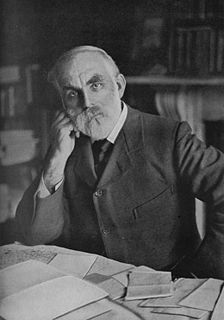A Quote by William James
All the higher, more penetrating ideals are revolutionary. They present themselves far less in the guise of effects of past experience than in that of probable causes of future experience, factors to which the environment and the lessons it has so far taught us must learn to bend.
Related Quotes
Children who are respected learn respect. Children who are cared for learn to care for those weaker than themselves. Children who are loved for what they are cannot learn intolerance. In an environment such as this, they will develop their own ideals, which can be nothing other than humane, since they grew out of the experience of love.
In general people experience their present naively, as it were, without being able to form an estimate of its contents; they have first to put themselves at a distance from it - the present, that is to say, must have become the past - before it can yield points of vantage from which to judge the future.
We are living in a culture entirely hypnotized by the illusion of time, in which the so-called present moment is felt as nothing but an infinitesimal hairline between a causative past and an absorbingly important future. We have no present. Our consciousness is almost completely preoccupied with memory and expectation. We do not realize that there never was, is, nor will be any other experience than present experience. We are therefore out of touch with reality.
We believe that the possibility of the future far exceeds the accomplishment of the past. We review the past with the common sense, but we anticipate the future with transcendental senses. In our sanest moments we find ourselves naturally expecting or prepared for far greater changes than any which we have experienced within the period of distinct memory, only to be paralleled by experiences which are forgotten.
Take the happiest man, the one most envied by the world, and in nine cases out of ten his inmost consciousness is one of failure. Either his ideals in the line of his achievements are pitched far higher than the achievements themselves, or else he has secret ideals of which the world knows nothing, and in regard to which he inwardly knows himself to be found wanting.
Certainly Christianity is an experience, but equally clearly the validity of ane experience has to be tested. There are people in lunatic asylums who have the experience of being the Emperor Napoleon or a poached egg. It is unquestionably an experience, and to them a real experience, but for all that it has no kind of universal validity. It is necessary to go far beyond simply saying that something comes from experience. Before any such thing can be evaluated at all, the source and character of the experience must clearly be investigated.
One does not have to be a 'climate change denier' to see that a degree of skepticism about the present consensus might be in order....Most likely, now - as in the past - many analysts have become carried away by the results of their models, which purport to look into a far distant future, and have convinced themselves that they must embark on a crusade to enlighten others.
A sustainable economy represents nothing less than a higher social order one as concerned with future generations as with our own, and more focused on the health of the planet and the poor than on material acquisitions and military might. While it is a fundamentally new endeavor, with many uncertainties, it is far less risky than continuing with business as usual.
In my experience, it is Affection that creates this taste, teaching us first to notice, then to endure, then to smile at, then to enjoy, and finally to appreciate the people who 'happen to be there.' Made for us? Thank God, no. They are themselves, odder than you could have believed and worth far more than we guessed.
Life is the future, not the past. The past can teach us, through experience, how to accomplish things in the future, comfort us with cherished memories, and provide the foundation of what has already been accomplished. But only the future holds life. To live in the past is to embrace what is dead. To live life to its fullest, each day must be created anew.







































